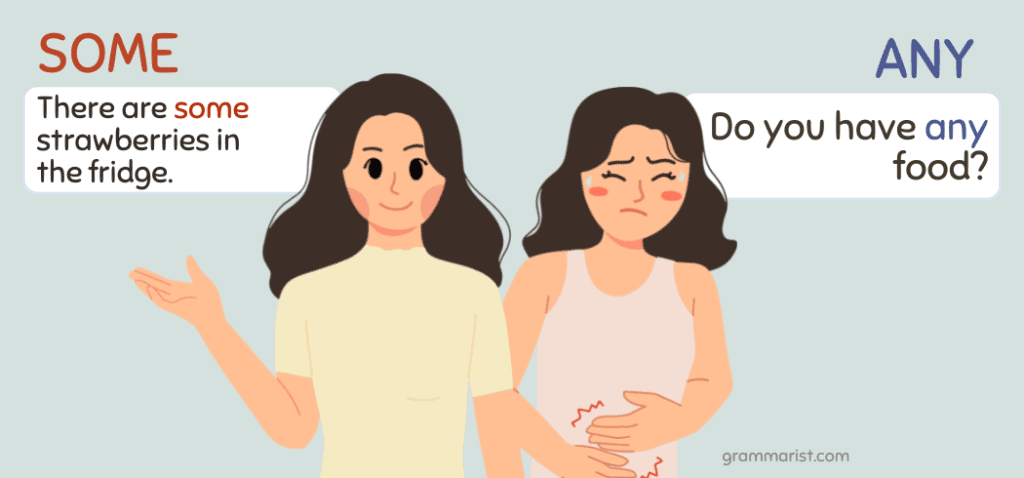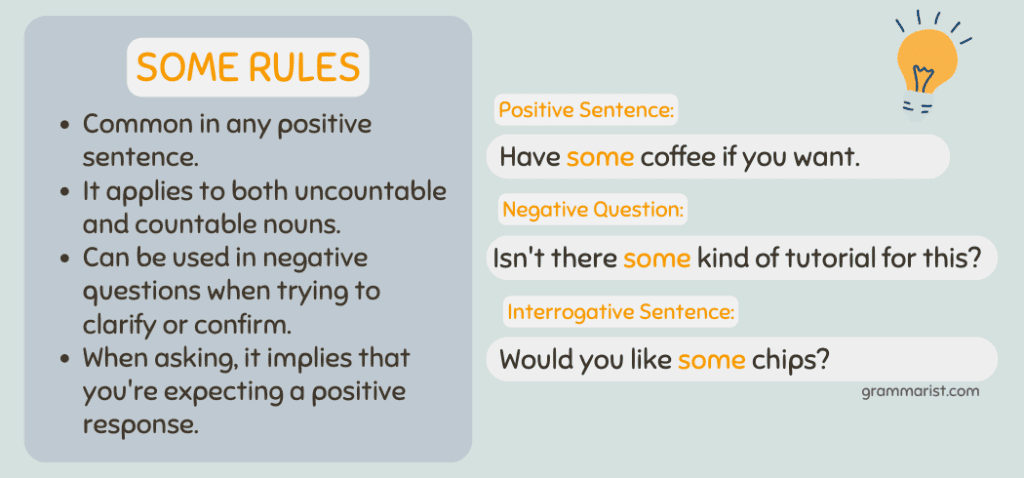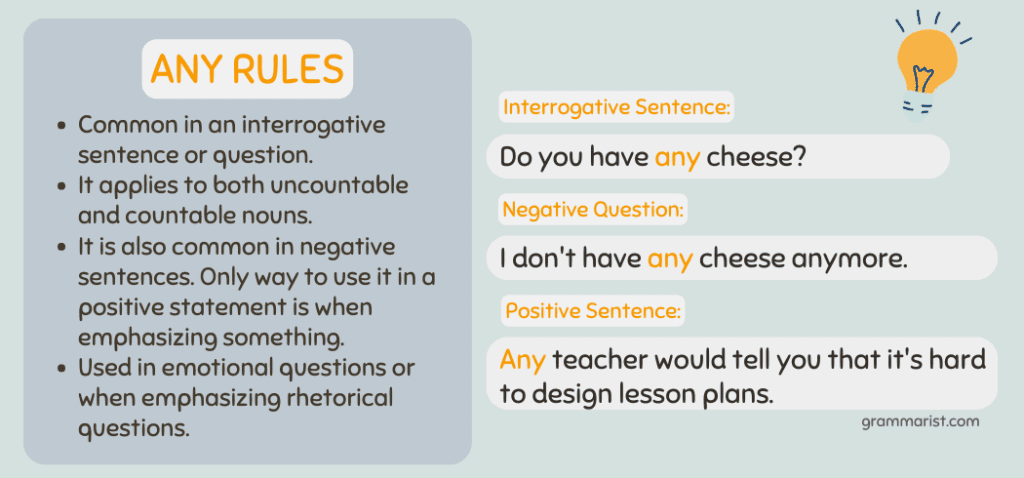Are you wondering how to use some and any? This is a debate I see among writers all the time. The general rule is to use some in positive sentences and any in questions and negative sentences. But despite this simple guideline, many people still get confused when writing sentences.
Let’s discuss the difference between any and some with examples that show how to use them in sentences. I also provided a worksheet at the end of the article to test your application of the two words.
Some vs. Any

Both some and any are determiners we use with plural countable nouns and uncountable nouns. A determiner is a part of speech that modifies nouns and noun equivalents, clarifying what a noun to which it refers. For example:
- Incorrect: Some jacket is too tight for me.
- Correct: Some jeans are too tight for me.
- Incorrect: Do you have any flower?
- Correct: Do you have any flowers?
We generally use some in affirmative sentences and any in negative statements. Take a look at these some and any examples.
- I have some friends at school.
- I don’t have any friends at school.
Some and any can also be pronouns when they have no following nouns. For example:
- I was looking for extra papers, but there weren’t any.
- We have tea at home. Do you want some?
Some Rules

The word some is common in any positive sentence. Here are some examples in sentences.
- Have some coffee if you want.
- I have some companions who live in Los Angeles.
As you can see in the sentences above, some applies to both uncountable and countable nouns. Remember that a countable noun has a singular and plural form, while an uncountable noun does not have a plural form. Here are more sentence examples.
- My kid wants some strawberry ice cream.
- I have some books you can borrow at home.
You can use some in negative questions when trying to clarify or confirm. For example:
- Isn’t there some kind of tutorial for this?
When asking questions, some also implies that you’re expecting a positive response. Below is an example.
- Would you like some chips?
Any Rules

The use of any is common in an interrogative sentence or a question. Use it for both countable and uncountable nouns. Here are some examples.
- Do you have any cheese?
- Does Mrs. Kim have any friends in Stars Hollow?
Any as a determiner is also common in a negative sentence. Read the sentence examples below.
- I don’t have any cheese anymore.
- She doesn’t want to get in any trouble.
The only way to use it in positive statements is when emphasizing something. For example:
- Any teacher would tell you that it’s hard to design lesson plans.
This word is also used in emotional questions or when emphasizing rhetorical questions. Consider the examples below.
- Do you have any idea what you’ve gotten yourself into?
- You didn’t do your homework! Do you have any idea how that will affect your grades?
Any is common in negative questions when confirming a negative expectation. For example:
- Don’t you have any money?
You can also use any in questions when expecting an open-ended answer. Here’s an example.
- Do you have any solution to this problem?
Examples of Some in Sentences
Let’s take a look at these examples of how to use some in sentences.
- I have some news about the TV show. (positive and uncountable)
- There are some strawberries in the fridge. (positive and countable)
- Don’t you have some kind of warm light for your room? (negative question for confirmation)
- Would you like some ice for your cocktail? (positive question expecting a positive response)
Examples of Any in Sentences
These sentences show how to use any in a sentence.
- Do you have any dresses for the gala? (interrogative and countable)
- Do you have any food? (interrogative and uncountable)
- Do you have any idea what you’re talking about? (interrogative and emotional)
- Don’t you have any money left for the concert? (negative questions confirming a negative expectation)
- Do you have any reason for committing this mistake? (interrogative for open-ended answers)
- I don’t want to have any problem. (negative sentence)
How to Remember the Difference
Here’s a summary of how to differentiate between some and any.
Some is for:
- Affirmative sentences.
- Negative questions when asking for confirmation or clarification.
- Positive questions expecting a positive response.
Any is used for:
- Most positive and negative questions.
- Most negative sentences.
Do You Have Some or Any Money?
The correct sentence is Do you have some money? Use some money for affirmative sentences and any money for questions and negative statements. For example:
- I can lend you some money.
- I don’t have any money left.
- Don’t you have any money?
Is There Any or Some Water?
Use some water for affirmative sentences and any water for negative statements. For example:
- I would like some water, please.
- We don’t have any water.
Would You Like Some or Any Help?
The correct sentence is would you like some help?
Can I Have Some or Can I Have Any?
The correct sentence is Can I have some?
Can You Start a Sentence With Some?
Yes, you can start a sentence with some. For example:
- Some of my friends are from Hartford.
Final Word on Some and Any
Even the best writers get confused between some and any. But I hope this article helped you understand how to use the two determiners or pronouns in the sentence.
Remember that some is used in affirmative statements, while any is more suitable for the negative form of a sentence.